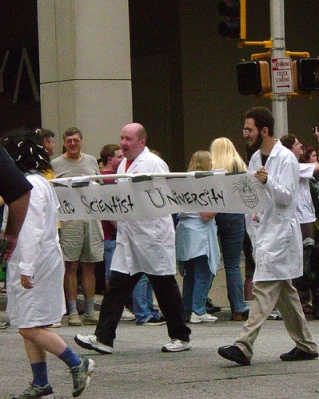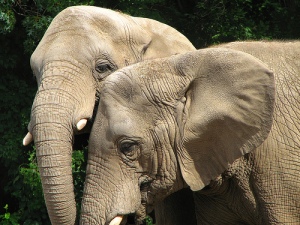One of the Deniers1 favourite tactics is to throw out this or that list or petition of “scientists” who are Climate Deniers (eg “The Deniers“). After you discard the obvious frauds (eg the Oregon Petition), cull out the names that are made up, the ones who are not scientists, the ones who are dead, the real scientists who are not actually Deniers, etc, you are invariably left with a handful who do seem to be scientists and really are Climate Deniers. Huh?
This can be very confusing to the lay person who has no experience with the sciences.
So just how many people are we talking about here? It’s hard to say actually, in part because it depends on just how you define a Denier (or Skeptic). Heartland’s much touted PR event of last winter seems to have drawn only 19 “real scientists” and Wikipedia lists only about three dozen. Given that there are millions of scientists in the world that’s pretty lame. Even so, if it were only one and she happened to be right then the millions wouldn’t matter - so what’s going on here?
Let’s step back for a moment and do a reality check. Reality - scientists are human beings. This has some implications:
In the first place there are some scientists who are just plain incompetent. It is an unusual department or faculty of any size that does not have at least one such creature shambling about. Whether they faked their way to tenure or subsequently developed problems of one form or another doesn’t matter, the fact remains they couldn’t conduct adequate science to save their life.
In some cases it is a more elderly member of the department who has not kept up with their field, possibly because of diminishing abilities or just plain loss of interest. Typically these people are inflicted on the first year students or cross promoted into some marginal role until they get the hint and take early retirement to devote themselves full time to their paper clip collection.
More common is the sad victims of the Dunning Kruger effect, people who are oblivious to the fact that they haven’t a clue what they are talking about. We all know people who are perfectly competent in many ways including whatever their profession is, but who hold very strong, grossly uninformed opinions about some topic, either related to their profession or completely different. For some unfathomable reason they imagine that they are also competent at this other topic. Maybe it’s how to manage the Florida Panthers, solving unified field theory, or how to “really” reduce crime.
Regardless of what the topic is the fact remains that they are actually totally clueless. Often they can even use a lot of the right terms and assemble them into coherent sentences, but really it’s utter gibberish. Normally everyone who knows them just rolls their eyes and goes to get a refill of coffee when the rant starts.
Naturally out of millions of scientists there are some who suffer from this affliction, and some of those have chosen climate science as the topic to have grossly uniformed opinions about. Regardless of the topic, what they have to say is nonsense and no one ever cared.
Until recently that is.
The last few years has seen the growth of the Denier Industry and a media wanting to present “both sides of the story”. Both have been very keen to find and publicize the views of anyone with a PhD who is willing to criticise climate science.
Chances are good that in the past few years you could get on TV if you were a Denier with a PhD, did not put your pants on backwards, and didn’t drool too much during the interview. Whether incompetent generally or just with respect to climate science, you could finally have your moment in the sun.
So how does the average person tell the difference between these drones and legitimate climate scientists? There are some tell tale clues.
One of the myths that contributes to the credibility of these crackpots is the B movie scientist who was trying to cross a hawk with a handsaw and accidentally discovered the Unified Field Theory. While there are certainly examples of the maverick who turned out to be right when everyone else was wrong, the fact is that in every case, by pure coincidence, they just happened to be working on the problem for years, if not decades.
So the first question is whether they are even in a relevant field. If you check the Denier lists you find many aren’t. A more important question is whether they have done any actual work on climate science. For legitimate academics their research history is almost invariably available with a quick online search.
However, these are merely indicators. The fact is that someone can have the “right” credentials and even been working directly on climate science and still be hopelessly wrong.
Equally, an intelligent street person who has spent her days reading at the University library could have a well informed, cogent and relevant critique of the science; so how do you tell? Some quick and easy to answer questions to ask yourself:
i) Do they just regurgitate the bogus Denier claims debunked at the excellent sites linked on the right under “Debunking Denier Nonsense”? Yes? Denier!
ii) Do they make specific reference to the science (eg “So and so’s 2004 paper in Nature set’s the forcing parameter too high because they assume …”) or do they give some vague, general statement that you are supposed to believe just because they are “a scientist” (eg “Models don’t work!”). The latter? Denier!
iii) Do they make wild leaps of logic that cannot be supported by the facts they present (if any)? eg “My work shows that the glaciers are actually melting slower than was previously thought, therefore humans are not causing climate change” Yes? Denier!
When these tests are applied to the “scientists” that appear on the Denier lists we find we are left with … well, no one really. I would be most interested if anyone knows of any exceptions, but I have never seen one.
The bottom line is that uninformed, unsubstantiated skepticism, whether by a climate scientist or a street person, is still bunk. Anyone using bunk to deny the reality of climate science is … a Denier1
Yes there are legitimate skeptics, and yes there is intense debate about aspects of climate science, such as radiative forcing and extreme weather. However, these disputes in no way undermine the general truth of anthropocentric climate change.
It’s equivalent to authorities having an intense discussion of exactly what shade of grey elephants are, or just how much of their diet is from grazing vs browsing. These uncertainties about specifics do not cast the very existence of elephants into doubt. Elephants exist regardless of what the answers to those questions are.
Is it possible that climate science is wrong? of course! It is also possible that elephants do not, and never did exist. Unlikely, but possible. Science never deals in absolute certainty, but it also does not reject common sense and rational thinking.
—-
1As I discuss here I do not use the term “Denier” to refer to all climate change doubters. Those who thoughtfully and intelligently address the facts I call ’skeptics’.
Those who irrationally deny the existence of the science and instead propagate the lies and distortions such as those discussed above and linked to the right under “Debunking Denier Nonsense” are “Deniers”.






No comments:
Post a Comment